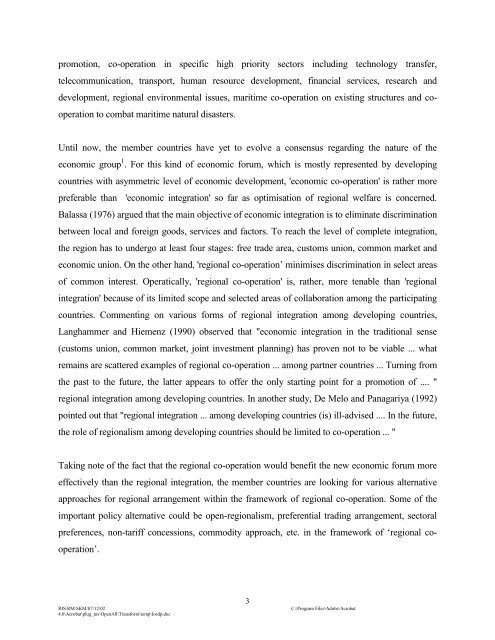dp11_pap
dp11_pap
dp11_pap
You also want an ePaper? Increase the reach of your titles
YUMPU automatically turns print PDFs into web optimized ePapers that Google loves.
promotion, co-operation in specific high priority sectors including technology transfer,<br />
telecommunication, transport, human resource development, financial services, research and<br />
development, regional environmental issues, maritime co-operation on existing structures and cooperation<br />
to combat maritime natural disasters.<br />
Until now, the member countries have yet to evolve a consensus regarding the nature of the<br />
economic group 1 . For this kind of economic forum, which is mostly represented by developing<br />
countries with asymmetric level of economic development, 'economic co-operation' is rather more<br />
preferable than 'economic integration' so far as optimisation of regional welfare is concerned.<br />
Balassa (1976) argued that the main objective of economic integration is to eliminate discrimination<br />
between local and foreign goods, services and factors. To reach the level of complete integration,<br />
the region has to undergo at least four stages: free trade area, customs union, common market and<br />
economic union. On the other hand, 'regional co-operation’ minimises discrimination in select areas<br />
of common interest. Operatically, 'regional co-operation' is, rather, more tenable than 'regional<br />
integration' because of its limited scope and selected areas of collaboration among the participating<br />
countries. Commenting on various forms of regional integration among developing countries,<br />
Langhammer and Hiemenz (1990) observed that "economic integration in the traditional sense<br />
(customs union, common market, joint investment planning) has proven not to be viable ... what<br />
remains are scattered examples of regional co-operation ... among partner countries ... Turning from<br />
the past to the future, the latter appears to offer the only starting point for a promotion of .... "<br />
regional integration among developing countries. In another study, De Melo and Panagariya (1992)<br />
pointed out that "regional integration ... among developing countries (is) ill-advised .... In the future,<br />
the role of regionalism among developing countries should be limited to co-operation ... "<br />
Taking note of the fact that the regional co-operation would benefit the new economic forum more<br />
effectively than the regional integration, the member countries are looking for various alternative<br />
approaches for regional arrangement within the framework of regional co-operation. Some of the<br />
important policy alternative could be open-regionalism, preferential trading arrangement, sectoral<br />
preferences, non-tariff concessions, commodity approach, etc. in the framework of ‘regional cooperation’.<br />
3<br />
RIS/RM/SKM/07/12/02 C:\Program Files\Adobe\Acrobat<br />
4.0\Acrobat\plug_ins\OpenAll\Transform\temp\Iordp.doc
















